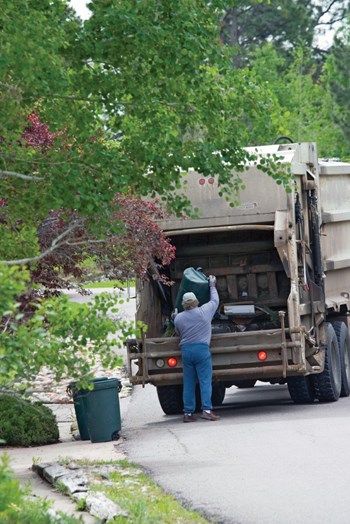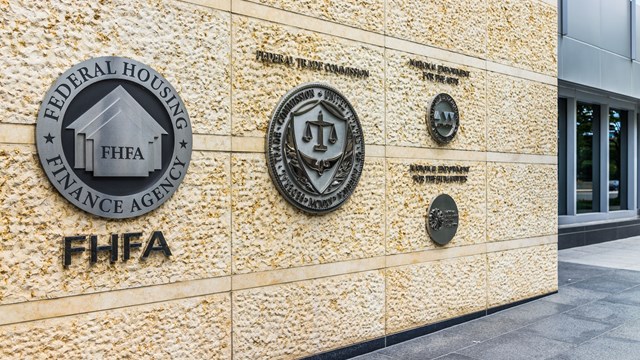
They pay the same property taxes, and pull electricity from the same wires; their residents go to the same schools and libraries, and vote for the same municipal officials. Yet there is one marked difference between many condominiums and their single-family house neighbors: trash. In towns and cities where the governments provide free trash pickup to single-family houses, condominiums are often required to foot the bill for the same service.Although this is certainly not a new issue, sharply rising costs for trash removal—and rising property taxes—are prompting condominium associations to re-examine the fairness of the situation. Following a number of successful campaigns across the country, many condominium residents throughout New England have organized and are pressing the local governments with renewed vigor for equality in municipal services.
While some condominium associations have pursued legal action, the most common and effective route seems to be the one that leads to city hall. Many condominium associations are learning to flex the political muscle of hundreds of condominium owners paying hundreds of thousands of dollars of property taxes. In some cases, larger umbrella organizations, like the Community Associations Institute’s New England and Connecticut chapters, are providing organizational support and procedural advice while others make use of local attorneys like Richard Brooks of Marcus, Errico, Emmer & Brooks, PC, in Braintree, Massachusetts, for legal advice.
Pro Bono Work
Brooks’ involvement with over 60 campaigns on behalf of the condominiums (most of them pro bono) began with a simple request to borrow his firm’s conference room. A group of condominium residents in Framingham, Massachusetts asked Brooks if they could use the conference room at his office for a meeting. They wanted to see if they could devise a solution to problem they were having with equity in trash pickup. Of course, it was not long before Brooks was pulled in and offering impromptu legal advice.
By the time the Framingham group had successfully petitioned the town government for trash pickup, Brooks was fully involved. Word of their success quickly spread and Brooks has since helped condominium organizations across New England prepare and lobby their local governments for help with trash pick-up, a large number of them successfully.
In Brooks’ experience, it is better to work a grass-roots campaign than start a legal battle. “It’s all politics,” he says. “You can’t force the towns to provide the service. You have to convince them to do it.” The issue essentially hinges on the fact that condominium residents pay the same property tax rate as single-family homeowners who receive the trash pickup for free, yet the condo owners must pay additional fees through their condominium associations. For the condo owners, it is an issue of fairness.
Brooks sees three things as necessary for a successful lobbying campaign. “First, it starts with a committed group of condo residents. They must be tax-paying residents of the town.” Brooks guesses that anywhere from 50 to 100 people who are willing to attend a meeting will provide the necessary local support needed to get the town government’s attention. Because rubbish removal is such a hot issue, recruiting those types of numbers usually requires little more than getting the word out via email, online newsletters, blogs, or even handing out fliers. Many groups are formed out of association meetings.
Once a group has formed and is willing to serve, Brooks typically calls a meeting of all interested parties. At that meeting, Brooks will explain each step of the process and answer questions about the legal aspects of their case. While there is some occasional legal merit, he tends to counsel groups away from legal proceedings, saying “it will be very expensive and you are most likely not going to win.” Instead, he outlines how to get on the agenda for the board of selectmen, city council, or whatever governing body can make the decision on trash removal for the municipality.
Out of the larger community group must come a single leader, a condominium resident willing to dedicate himself or herself to the campaign. Frequently, this leader is already set by the condominium association, but occasionally, someone else will step up who feels passionate about the issue. Most times, it is this person who serves as the liaison between Brooks and the residents.
A third but no less important key ingredient to success is having a municipal person supportive of your cause. In Vernon, Connecticut, that person was Council member (later Mayor) Diane Wheelock, who helped revive an earlier campaign, and, through persistence and creativity, found a solution to the problem in Vernon.
In that city, the problem was technical and financial: Vernon had rear-loading trucks while the condominiums had front-loading dumpsters, which prevented them from being hoisted by town-owned trucks. The problem was solved through a deal where the condominiums paid for a front-loading truck for the town and the town picked up the rest of the cost.
Bridgeport’s Battle
Bridgeport, Connecticut condominium owners may already have their ally in newly-elected Mayor Bill Finch. In some ways, Bridgeport's battle has already been won. In the early '90s, Bridgeport condominium associations lobbied successfully to get trash pickup at condo sites and have enjoyed frequent trash pickups for many years. However, when trash hauling company All American took over the city contract from Waste Management, they decided to pick up trash only once a week, as stipulated in the contract, as opposed to the two or three times a week the previous hauler had been emptying the dumpsters. As a result, the dumpsters are now overflowing and the residents are fuming.
After voicing their concerns in the media, Bridgeport condominium residents were invited to talk to the mayor directly. At a February 2008 meeting, the newly-elected mayor listened to complaints of over-full dumpsters, rodent infestations, and garbage left lying around public areas. In response, Finch vowed to try to include more frequent trash pickups for condominiums when the city renegotiates the contract at the beginning of this summer. An important facet of those negotiations will be looking at each condominium's specific needs and trying to offer targeted services.
Finch said he was willing to support the condominiums because they "presented their case in a straightforward, calm, and rational way. They were persistent and professional." However, his support does not come for free. Looking for ways to reduce expenses in a "Trash to Energy" state (where all trash must be incinerated rather than put in a landfill), Finch asked the condominium associations to increase their recycling. As Mayor Finch points out, "anything you can take out of the waste stream greatly reduces the cost of incinerating that waste."
The Tipping Point
While things may indeed work out cleanly for Bridgeport, the issue is not always as straightforward as it may seem. At a time when many municipal districts are facing repeated budget shortfalls, extending trash service to condos at a cost of hundreds of thousands of dollars is an increasingly difficult sell, and many communities are fighting the change.
As Brooks points out, a community that has just suffered closing a school or library due to lack of funding, simply cannot add to the municipal budget. In fact, some communities are looking to phase out all municipal trash service rather than expand it. For example, along Cape Cod, only the towns of Falmouth, Provincetown, and Bourne still pick up all residents' trash at the curb. Some communities are looking at instilling a "pay per throw" program (where residents buy trash tags for each bag disposed) while others are automating their trash pickup to keep costs down.
There are other obstacles as well. Some government officials point to original permitting and zoning regulations which allow condominiums to be developed only if they don’t draw from the city’s municipal services. Other sticking points include the concern about town vehicles on condominium’s private roads, dumpster styles, and apartment buildings asking for the same rights. For Brooks, these are minor issues that can be easily handled. For example, he says that if the town is concerned about trespassing on private land to pick up the garbage, “we’ll give them permission. Issue solved.”
The Power of Green
One bargaining chip condominium associations may bring to the table is recycling. In states like Connecticut where municipalities pay exorbitant fees to have their trash burned for energy, recycling has tremendous financial upside. Mayor Finch points out that condominium associations are able to insure greater participation and standardization in programs like recycling, where Finch must rely on homeowners' ethical standards for the volunteer recycling programs. Beyond the obvious environmental merits of a strong recycling and composting program, these programs can greatly reduce the amount of rubbish produced by any given condominium unit. This can both save a lot of money and perhaps generate positive stories for the municipality.
In fact, that might be an additional facet of a successful campaign. In places like Vernon and Bridgeport, local newspaper stories about the issue were very instrumental in the eventual success of the condominium owners. In Bridgeport, it was the media that brought the issue to the attention of the mayor’s office, who in turn scheduled the first meeting.
Beyond the Rubbish
Although the majority of organizations devoted to obtaining trash pickup either formally dissolve or just fade away after the municipal campaign ends (successfully or unsuccessfully), there is still much potential left in the groups. Attorney Brooks points out that there should be equity in all municipal services. Other potential areas for campaigns include equivalent snow plowing services, street lighting, and road maintenance. However, for many condominium associations, the most important thing is for the town to take out the trash.
Robert Todd Felton is a freelance writer based in Amherst, Massachusetts.






Comments
Leave a Comment